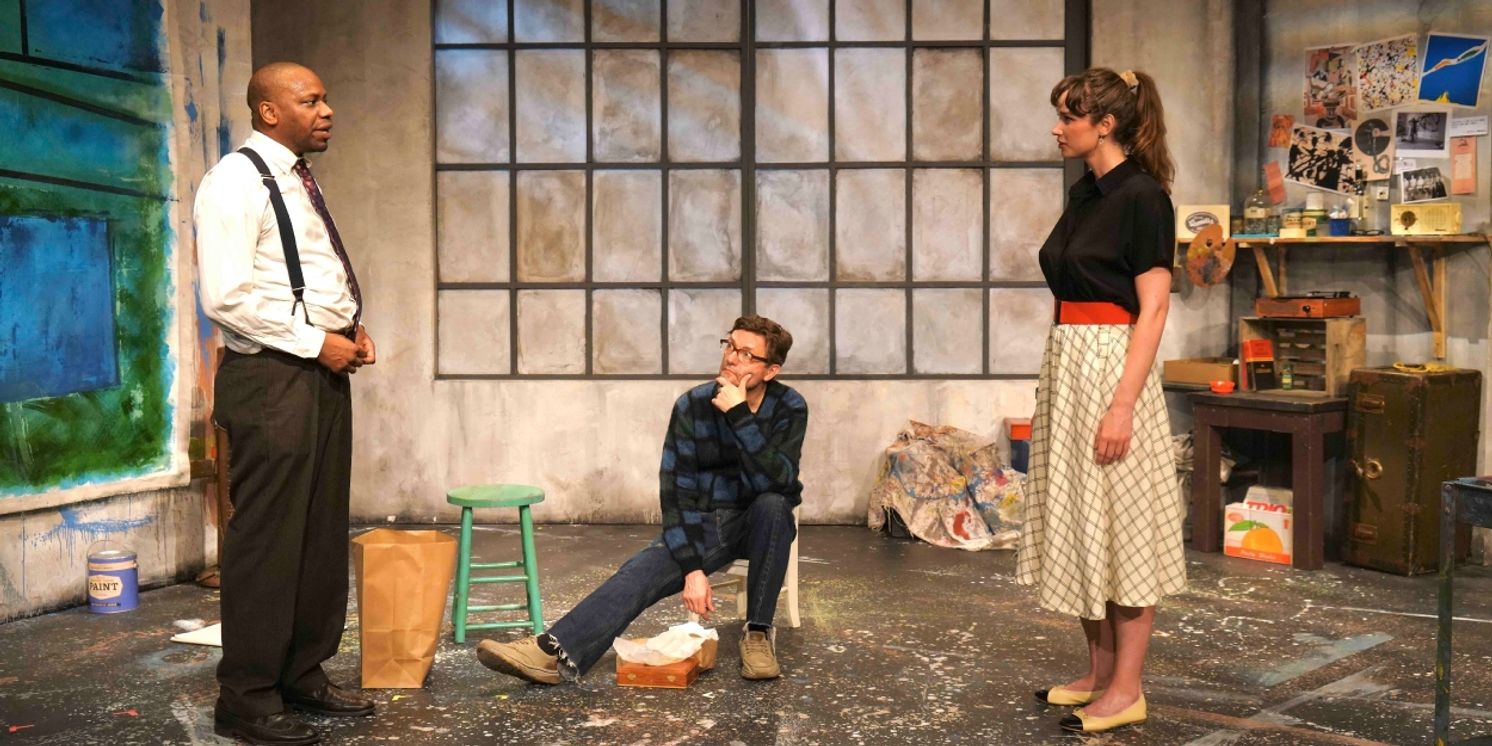Review: BRUSHSTROKE at Odyssey Theatre Ensemble
BRUSHTROKE plays through March 3 at 2055 S. Sepulveda Blvd., Los Angeles.

Consider the simple paint brush, simultaneously a subversive weapon, the gateway to aesthetic sublimity or – in the views of some important people – perhaps a means of preserving American freedom. All of this may sound hifalutin, but John Ross Bowie’s Cold War comedy BRUSHSTROKE considers the role of “art” from a bunch of different angles, and fashions a very nifty play around it. Bowie – also an actor who recurred as the Elmer Fudd-sound-alike Barry Kripkie on THE BIG BANG THEORY – is no slouch of a playwright. Directed by Casey Stangl, the work is having its world premiere as a visiting production at the Odyssey Theatre.
A four-hander with three delicious complex roles, BRUSHSTROKE centers on the relationship between Marvin, an art-loving civil servant and Ted, the middle-aged painter upon whose work Marvin fixates for reasons that are more than personal. The play is set in 1956 on the Lower East Side as paranoia over all things Russian is at a fever pitch, to the point where the government-funded Congress for Cultural Freedom (CCF) is trying to enlist abstract expressionist artists to try to win back the American left. If you think something as nutty sounding as the CCF’s mission might prove fodder for a sharp comedic think piece, clearly you and Bowie are of equal minds. With the technical pieces in place – canvases included –actors Malcolm Barrett, James Urbaniak, Brendan Hines and Evangeline Edwards combine to infuse BRUSHSTROKE with the requisite zing.
When he turns up at a gallery at the play’s opening, one time art history major (at Yale, no less) Marvin Kovacs (played by Barrett) is a suit-wearing painter fanboy blathering on about his love for new frontiers and the people who explore them. In a spin on the meet cute, Marvin is unknowingly gushing about a Ted Berkow painting to the artist himself (Urbaniak). Marvin buys the painting and later shows up at Ted’s apartment with an offer that any artist would relish. As a representative of the Congress for Cultural Freedom (funded by private equity), Marvin wants to “make things easier for Ted,” to help promote American art and engender “what comes next.” Ted and his sister and assistant, Susan, (Edwards) are all in, and the three proceed to get high together and explore the delights of the East Village. An odd duck herself, Susan is a former veteran of the Women’s Army Corps who now cleans her brothers’ paint brushes, and rocks out to Mediterranean music and is content to play second fiddle to her brother’s artistic genius.
All is not entirely as it seems. Marvin periodically checks in with his boss Allan (Hines) during secretive meetings in Central Park where the two suits speak code to each other and hold up newspapers. The secretive nature of Marvin’s mission – which he tries to keep from Ted and Susan as their friendship grows – keeps Bowie’s tale on its snake-like course. This is a spy thriller; no it’s a comedy, make that perhaps even a love story with an aesthetic sensibility and a fondness for Trotsky and egg creams. To say too much more on the plot front would be to spill secrets, which we are under strict orders not to do.
As previously noted, BRUSHSTROKE is both an intelligent and witty play that keeps its focus while keeping us guessing. Stangl pilots the journey with efficiency and a light touch and her cast falls easily into step. Using a pronounced limp and a face full of stubble, Urbaniak’s scruffy Ted is a free spirit who is, nonetheless, not about to get played. In Urbaniak’s hands, we get why a cat like this would end up on the CCF’s must-have/must-watch list.
Edwards’s Susan offers equal enticements as a quick-witted, independent and rather mysterious woman too long eclipsed by her brother’s fame. Just by watching her dance, first by herself and then partnering with a stranger who has just entered the room, we understand character’s attraction – to Marvin and to anyone.
Marvin is the play’s anchor, and Barrett delivers him with panache. Simultaneously BRUSHSTROKE’S most complicated and most straightforward character, Marvin is a guy whose love of beauty clash with his obligations. Barrett’s full nerd gawkiness and conviction are equally endearing. High or loaded, idealistic, naïve or running the game, the actor makes Marvin one to root for.
Plaudits also to scenic designer Keith Mitchell whose sparse gallery and artist’s apartment sweetly evoke the period. Shout-out to whoever designed the large unfinished blue and green canvas of Ted’s that plays a considerable role in the action. At one point, keying in on the blue’s melancholy tone, Marvin describes it as “dynamic, propulsive, seems to vibrate…some of the lines seem to be rushing off the canvas, almost as if to escape the encroaching…whatever it is that’s encroaching.”
Admittedly, a painting – like a life, a motive - can be read many different ways. BRUSHSTROKE makes readers out of us all and allows us to delight in the effort.
Photo of Malcolm Barrett, James Urbaniak, and Evangeline Edwards by Zoe Tiller
Reader Reviews

Videos

